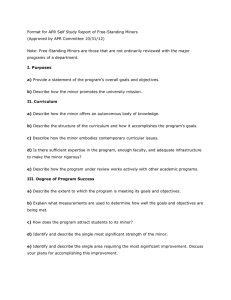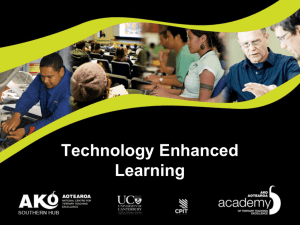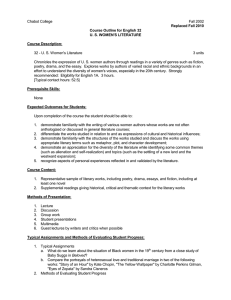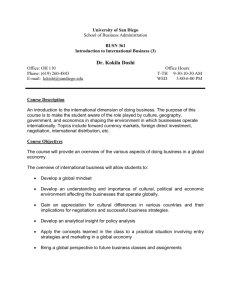Political Science/Public Administration May, 2014 October, 2013 June, 2014
advertisement
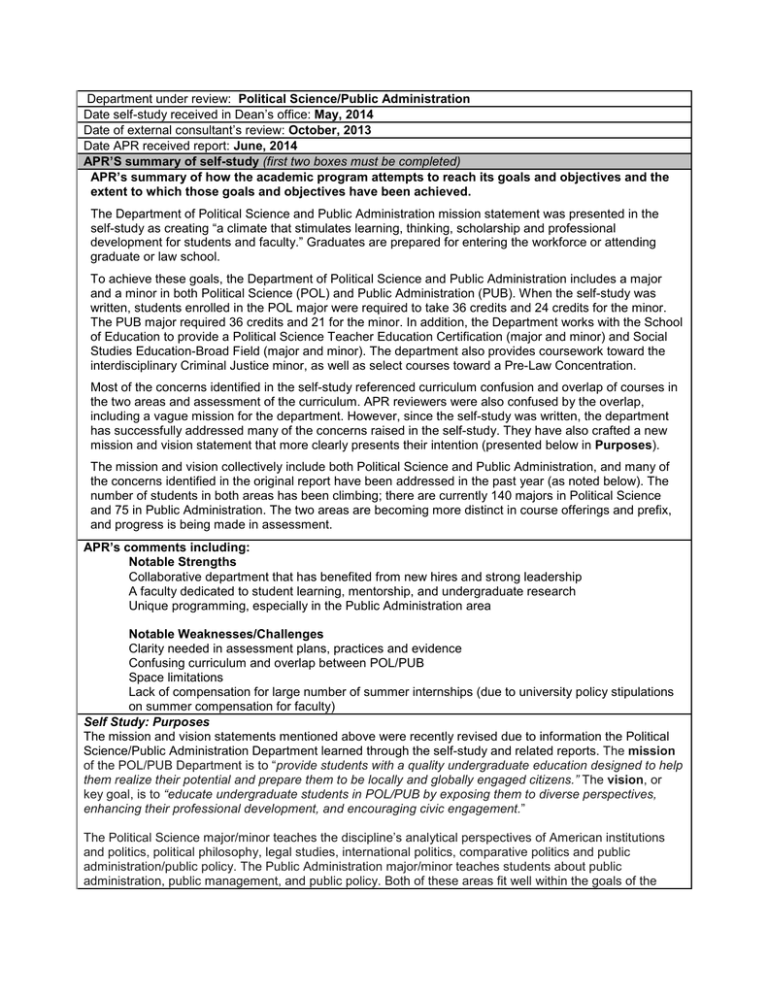
Department under review: Political Science/Public Administration Date self-study received in Dean’s office: May, 2014 Date of external consultant’s review: October, 2013 Date APR received report: June, 2014 APR’S summary of self-study (first two boxes must be completed) APR’s summary of how the academic program attempts to reach its goals and objectives and the extent to which those goals and objectives have been achieved. The Department of Political Science and Public Administration mission statement was presented in the self-study as creating “a climate that stimulates learning, thinking, scholarship and professional development for students and faculty.” Graduates are prepared for entering the workforce or attending graduate or law school. To achieve these goals, the Department of Political Science and Public Administration includes a major and a minor in both Political Science (POL) and Public Administration (PUB). When the self-study was written, students enrolled in the POL major were required to take 36 credits and 24 credits for the minor. The PUB major required 36 credits and 21 for the minor. In addition, the Department works with the School of Education to provide a Political Science Teacher Education Certification (major and minor) and Social Studies Education-Broad Field (major and minor). The department also provides coursework toward the interdisciplinary Criminal Justice minor, as well as select courses toward a Pre-Law Concentration. Most of the concerns identified in the self-study referenced curriculum confusion and overlap of courses in the two areas and assessment of the curriculum. APR reviewers were also confused by the overlap, including a vague mission for the department. However, since the self-study was written, the department has successfully addressed many of the concerns raised in the self-study. They have also crafted a new mission and vision statement that more clearly presents their intention (presented below in Purposes). The mission and vision collectively include both Political Science and Public Administration, and many of the concerns identified in the original report have been addressed in the past year (as noted below). The number of students in both areas has been climbing; there are currently 140 majors in Political Science and 75 in Public Administration. The two areas are becoming more distinct in course offerings and prefix, and progress is being made in assessment. APR’s comments including: Notable Strengths Collaborative department that has benefited from new hires and strong leadership A faculty dedicated to student learning, mentorship, and undergraduate research Unique programming, especially in the Public Administration area Notable Weaknesses/Challenges Clarity needed in assessment plans, practices and evidence Confusing curriculum and overlap between POL/PUB Space limitations Lack of compensation for large number of summer internships (due to university policy stipulations on summer compensation for faculty) Self Study: Purposes The mission and vision statements mentioned above were recently revised due to information the Political Science/Public Administration Department learned through the self-study and related reports. The mission of the POL/PUB Department is to “provide students with a quality undergraduate education designed to help them realize their potential and prepare them to be locally and globally engaged citizens.” The vision, or key goal, is to “educate undergraduate students in POL/PUB by exposing them to diverse perspectives, enhancing their professional development, and encouraging civic engagement.” The Political Science major/minor teaches the discipline’s analytical perspectives of American institutions and politics, political philosophy, legal studies, international politics, comparative politics and public administration/public policy. The Public Administration major/minor teaches students about public administration, public management, and public policy. Both of these areas fit well within the goals of the College of Liberal Studies and prepare students for professional careers in government, non-profit agencies, graduate school, or law school. The Public Administration major is unique, in that very few schools have such programming. As a result, graduate programs in Public Administration look favorably toward UW-L students who earn this degree. A survey sent to faculty members in POL/PUB for purposes of writing the self-study revealed that the POL curriculum did not fit important changes reflected in the academic discipline. Those changes include the evolution of four principle subfields: American politics, comparative politics, international relations, and political theory. Concerns related to overlap in coursework between POL/PUB suggested a major curriculum overhaul was needed in order to more accurately serve students in both areas. Major progress has been made to this end and is discussed in more detail in Curriculum. Additional programming goals include contributions to the School of Education with specific coursework discussed below. The primary objective of the department’s role in the interdisciplinary Criminal Justice minor, firmly rooted in the College of Liberal Studies, is to provide coursework toward that minor. Finally, while there is no pre-law program at UW-L, some students may choose specific coursework from the department that is related to the law; twelve POL/PUB courses fit this concentration. Self Study: Curriculum The department is currently engaged in a curricular redesign that allows for a clearer distinction between the Political Science and Public Administration programs. For the sake of brevity, the APR reviewers will focus on the proposed changes rather than the now-dated curriculum description provided in the 2012 self-study. The focus of the redesign is on the major/minor in both Political Science and Public Administration. In the past few months, twenty-five peer institutions were researched to look for trends, and one particular school became the model because they also offered a major in PUB (James Madison University). A primary concern that emerged in the self-study was the overlap of courses previously offered and inconsistencies in the POL and PUB prefixes. Over the past several months, the department has revised, deleted or added 55 courses. Included in this revision are 14 specific courses that moved from the POL prefix to the PUB prefix. This work was recently approved by the CLS/Academic Oversight Committee and UCC; changes will affect students enrolling in the POL/PUB major/minors next fall. The curricular redesign has capitalized on the strengths and trends in both programs, further complemented by new faculty members dedicated to PUB research and teaching. At the time of this writing, the department was proposing 30 credits (rather than 36) for the Political Science major. The Political Science minor has already been approved by UCC to move from 24 credits to 18 credits. While there are course changes to the Public Administrative major/minor, the number of credits required will remain the same (36/21). The self-study also included concerns with the Capstone. Both the majors and the minors were required to take the Capstone; however, only the majors had to take prerequisites for it, putting the minors at a disadvantage. Further, the capstone course was not similar for students, as the experience depended on which section/instructor they had. In response to the external reviewer and follow-up curricular changes, the Capstone is part of the department’s re-design. Minors will no longer have to take the course and all Capstone sections will require a writing profile, ensuring better consistency in the students’ experiences. Less attention has been given to the School of Education curriculum, but now that the major/minor changes are solidified, consultation in how those changes affect education majors can move forward. At this time, Political Science Education Majors are required to take 37 credits in the department and minors take 21. The Social Studies (Broad Field) Major certification program requires 56-63 credits from a variety of areas, with the minor requiring 8-24. The Criminal Justice minor students select six credits from 11 offerings in POL/PUB. Finally, the department offers 12 courses that fit within the pre-law concentration. Self Study: Assessment of Student Learning & Degree of Program Success As acknowledged in the self-study, the previous APR led to revised SLOs which had not yet been systematically incorporated into the POL/PUB curriculum. The data provided in the self-study affirmed that work needs to be done both with SLOs and with formal assessment practices. The assessment section of the self-study was difficult to navigate and included attention to assessing student writing, indirect reports from students on a peer review writing intervention, and reports of individual rather than collaborative assessment practices in select courses. Further review of biennial assessment reports and appendices confirmed that work needs to be done to more systematically plan, collect and report assessment results that include rubrics, clear and consistent reporting of general education assessment, and stronger connections between programmatic and/or course objectives. The APR reviewers note that while the self-study appeared to reflect a piecemeal approach to assessment, the current state of affairs has greatly improved. Once again, the Political Science and Public Administration Department has revised the SLOs, which are now streamlined with four primary programmatic objectives. The objectives are shared by both areas (POL/PUB), and include 12 “sub-objectives” which allow for course mapping. At this time, the department is mapping all courses and feels they are poised to move ahead with a clear assessment plan. They have appointed a department member to serve in the role of Assessment Coordinator. Related, the department has appointed a subcommittee to monitor and assess online courses as that mode of delivery continues to become more prevalent. Finally, the department assessment has focused primarily on writing competencies. As noted in the self-study, the coursework in POL/PUB has a heavy writing emphasis, and the department is interested in becoming a writing-in-the-major program. This programmatic addition would serve the students well, but the department has yet to make this happen. The self-study provides other evidence of program success, including active participation in SoTL work, OPID and CATL grant funding, and employing High Impact Practices for student engagement. This involvement has contributed to “best practice” strategies that have become a regular part of departmental research, discussion, and opportunities. More specific evidence of program success is suggested through shared goals of continued work with improving and assessing student writing, collaborative experiences in the classroom, and undergraduate research. Self Study: Previous Academic Program Review and New Program Initiatives The previous APR recommendations included 1) improved assessment; 2) consider program needs in future hiring, and 3) secure resources for classroom modernization and Mock Trial/Model UN. As addressed in the previous section, the assessment improvements are well under way and the POL/PUB Department is poised to move forward with programmatic objectives relevant to both areas. Since the last APR, the SLOs have been rewritten twice, with the second version resulting from a departmental retreat (suggested by the external reviewer). This version has been instrumental in the mapping of course objectives, currently in progress. The revised mission, vision and SLOs have been informed by the addition of eight new hires. Three of these hires are able to provide coverage in the PUB area, allowing for each PUB offering to be taught at least once every two years. At the time of this writing, the POL/PUB Department was in process of hiring an additional Public Administration faculty member. Previous concerns with classroom modernization have been resolved with classroom space now available in Centennial Hall. Other space needs that emerged in the most recent self-study are addressed elsewhere in this report. The funding issue for Model UN and Mock Trial is still ongoing as more pressing priorities with curriculum and assessment have been the focus. Self Study: Personnel The study notes a significant change in personnel as eight new faculty members joined the department. Three of those faculty members are dedicated to the Public Administration major/minor, and at the time of this writing, a search was in progress for a fourth faculty member in PUB. Clearly, the increase in personnel has brought excellent insight to the critical programmatic changes being made in both areas. The increase in departmental personnel called for a small group of senior faculty members to mentor a large group of probationary faculty members, who have added new strengths and revitalization to the department. A chart provided in the self-study shows faculty interests/contributions in teaching, research and service and the variety of work is impressive. The chart is also valuable in assessing faculty workload, and with the exception of one senior faculty member with no reported activity in research and service, the department appears productive, vibrant and balanced. Strengths that emerge here, as well as reported elsewhere in the self-study, include strong mentoring in undergraduate research, securing an impressive amount of undergraduate research grants, heavy involvement in professional development opportunities, collaboration among faculty and with students, and strong community involvement with service learning and internships. The APR reviewers agree with concerns raised regarding workload and personnel. Salary issues are not unique to faculty in CLS, and in this department specifically, the mid-level faculty are underpaid due to compression and inversion. Data in the self-study reveals that promoted faculty members, particularly in the PUB area, lag more than $12,000 below CUPA data, even after a promotion increase. Another concern is in workload--while the 4/4 load itself is not unique to the department, the number of preps is quite high. Even the new(er) faculty members have had to prep 3-4 different courses each semester, making it difficult to balance teaching with research and service. Self Study: Support for Achieving Academic Program Goals (Resources) A primary concern raised in regard to resources was the use of space. Currently, there is no “shared space” for either students or faculty members, so all meetings and student interactions take place in offices or reserved classrooms. There is also no space for students to work, such as computer lab space, a library for students, etc. The APR reviewers felt this was an important consideration given the amount of time and effort the faculty members dedicate to student groups, undergraduate research, analyzing data, etc. Further, the departmental offices make it difficult for visitors to interact; the flow is awkward, departmental members are spread out in three different sections of Wimberly, and the set-up does not allow for the collaborative and welcoming nature of the department. An increase in faculty members, along with shared space on the fourth floor of Wimberly, has further impacted the need for better space. Although spacing may be reconfigured in Wimberly pending the move of CBA to Wittich Hall, the timeline nor the plan are clear. In the short term, shared space for students should become a priority. Another concern regarding resources comes with the active Internship program. The Public Administration major requires an internship, and due to the nature of the work and hours, most students take the internship credits in the summer. Although not required, students in Political Science also have internships. Unfortunately, the UW-L summer pay plan has affected internship advising compensation, not allowing faculty members to get paid unless they have a minimum amount of SCH. Since the report was written, the department has attempted to rectify the situation by pooling all summer internships to one faculty member. This plan worked effectively last summer and is also working for semester loads. The internship faculty member will rotate among POL and PUB individuals. External Reviewer Recommendations APR’s Comments on External Reviewer (if applicable) The external reviewer’s comments provided the department with significant and valuable feedback, much of which has already been addressed by the department and in this report. The reviewer reinforced the need to improve assessment practices and consider separate SLOs for assessing the two areas. While POL and PUB can and should be reinforcing, they are also distinct, and he notes that “there should be at least some area of assessment that is unique to each of the majors.” The report indicated some concerns with declining enrollment in POL, since this was not consistent with national trends and growth. Since that time, the number of majors has stabilized in POL and increased in PUB, bringing total enrollment back to a healthy number. As suggested by the reviewer and confirmed by the department chair, the increase in PUB specifically is likely due to program modifications and new faculty members who have established their place and reputation in the department. The reviewer notes the department has high-quality and highenergy faculty members willing to take on leadership roles that will continue to move the department forward. The reviewer also suggested highlighting the unique PUB program to external constituents, continued work in clarifying the differences between the majors, and the need for improved or shared physical space. Department’s response to the Reviewer Recommendations APR’s Comments on the Department’s Response (if applicable) The Political Science and Public Administration Department was very responsive to the external reviewer’s comments. They followed through with a retreat (December 2013) which served as a springboard for continued work with the mission statement, SLOs, and curricular revisions. The response also highlighted “institutional items” that while important, the department felt they would need support from administration. Included was the issue of internship numbers and compensation, which actually has been addressed, as well as concerns with salary compression and physical space. Dean’s Letter APR’s Comments on Dean’s Letter (if applicable) The Dean’s letter concurs with the external reviewer’s assessment and acknowledges the progress that the Political Science and Public Administration Department made to address the reviewer’s comments. She suggested the department put forward a rationale for an open position based on the needs of the department, and at this time the department is completing a search for an additional PUB faculty member. While supportive of space needs and summer pay for internship advising, the Dean was not able to provide short-term solutions. As noted, the department has creatively resolved the internship issue. The Dean also confirms the reviewer’s notes that the “program possesses numerous strengths and among these is the high-quality of its faculty,” and that they are well-positioned to move forward as they continue to provide excellent opportunities for their students. APR’s Recommendations (must be completed) Recommendations: 1. Develop a clear assessment plan that more clearly addresses programmatic assessment for both Political Science and Public Administration. 2. Provide assessment data that includes rubrics and results that clearly delineate programmatic assessment in POL, PUB, general education assessment, and course assessment. 3. Continue work in curricular redesign, including work with the School of Education. 4. Address space issues by pursuing temporary solutions rather than wait for permanent solutions, especially as needed for students and mentoring. 5. Commit to becoming a writing-in-the-major program since most previous assessment and ongoing work in the department has taken such an intensive writing focus. 6. Promote the good work of the department, faculty and students to the campus at large, including those things that make the department unique. ⃞ No serious areas to address – review in next regularly scheduled cycle ⃞ Some areas to address – review in next regularly scheduled cycle X Some areas to address – department should submit short report on progress to Faculty Senate / Provost’s Office in three years. The short report is for assessment update only, and will address recommendations 1 & 2.
